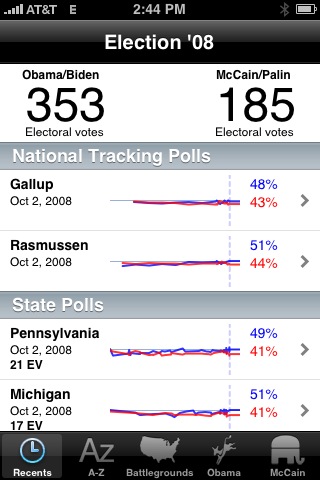The endgame of the 2008 election season is interesting in a few ways. First, I find it interesting that Obama’s numbers go way up after people get to see him in action (e.g. during debates), and start to edge back down when robocalls and other personal attacks start to hit. In particular, it’s interesting to compare the projected electoral map from the beginning of the week to today, when Florida becomes a toss-up state again, as well as seeing the effect of ebbing Obama support in West Virginia and New Hampshire (and a gain in South Dakota).
But of more interest to me at the moment is a local question: what if Massachusetts abolished its state income tax? What’s interesting to me is not the question itself, which as I wrote yesterday is an idiotic response to crisis (and the New York Times agrees), but rather how loud the voices are about the question. The question isn’t drawing the same urgent public outcry as the effort to get the legislature to put marriage to a referendum, but it’s a pretty loud outcry nonetheless. And it makes me wonder: what’s really going on? Does being a social conservative in a state like Massachussetts just get more and more frustrating until one feels compelled to hold the recipients of critical government services hostage to get one’s demands met? I sometimes think that if I were conservative here, I’d feel effectively disenfranchised and thus would be inclined to grand gestures.
Nevertheless, there are quite a few people I’ve heard from who think it would be a good idea because it would make the legislature “pay attention” to their concerns about waste. To which I reply: there are more constructive ways to pay attention, and more constructive ways to reform. Specifically, I urge anyone who’s thinking about voting Yes on Question 1 to try making the cuts yourself first, with the Boston Globe’s Massachusetts Budget Game Calculator. The brilliant thing that you learn as you go through the budget item by item is just how limited the options are, and just how many challenges are in your way.
And there are challenges, because the budget is non-linear. Reducing spending in some areas leads to reduced state revenue and federal grants, making the job that much harder. Here’s an example: cutting 25% from the $32.2 billion state budget across the board (a chainsaw of a budget cut, if you will) nominally removes $8 billion in expenditures but only closes the budget gap by $4.9 billion, thanks to losses in federal funds and inability to get revenue. In fact, even a 50% cut across the board still leaves a $2.5 billion deficit.
The irony is that we’re already seeing big cuts in state government, thanks to the market meltdown, and we’ll see more. So even with a nationwide progressive sweep on November 4th (and that’s an unlikely scenario), the state is going to have to be fiscally conservative to make it through the coming recession. And that’s without a yes vote on tax abolition. Proponents of the abolition of the tax claim it will make the state a more attractive place to live and work, but the massive hatchet of Question 1 could ruin us.


